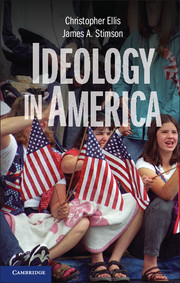Book contents
- Frontmatter
- Contents
- List of Figures
- List of Tables
- Preface
- Acknowledgments
- 1 The Meaning of Ideology in America
- 2 Operational Ideology: Preferences Data
- 3 Operational Ideology: The Estimates
- 4 Ideological Self-Identification
- 5 The Operational-Symbolic Disconnect
- 6 Conservatism as Social and Religious Identity
- 7 Conflicted Conservatism
- 8 Ideology and American Political Outcomes
- Bibliography
- Index
8 - Ideology and American Political Outcomes
Published online by Cambridge University Press: 05 June 2012
- Frontmatter
- Contents
- List of Figures
- List of Tables
- Preface
- Acknowledgments
- 1 The Meaning of Ideology in America
- 2 Operational Ideology: Preferences Data
- 3 Operational Ideology: The Estimates
- 4 Ideological Self-Identification
- 5 The Operational-Symbolic Disconnect
- 6 Conservatism as Social and Religious Identity
- 7 Conflicted Conservatism
- 8 Ideology and American Political Outcomes
- Bibliography
- Index
Summary
In the previous three chapters, we have addressed the underpinnings of the operational-symbolic disconnect in American public opinion. Some of this disconnect is born of the conflation of the political meaning of the terms “liberal” and “conservative” with their meanings in other social and extra-political contexts. Some of it stems from systematic confusion of the political meanings of the terms – confusion aided, at least to some extent, by the ways that liberals and conservatives present themselves through the lens of the mass media. The end result is that operational ideology and symbolic ideology, at least for large segments of the electorate, remain reliably distinct concepts, formed as a reaction to different events, updated in response to different factors, and associated with their own set of underlying meanings.
In this final chapter, we work to integrate the findings of this book, seeking to understand the place of operational and symbolic ideology in the broader American political system. We also discuss what a better accounting of this “dual nature” of ideology in American political life can tell us as students of public opinion, survey research, and political dynamics in the United States.
MAKING SENSE OF IDEOLOGY IN AMERICAN POLITICS
The summary finding of this book is simple: Depending on the frame of reference one uses, the American public is both liberal and conservative. In the symbolic realm, conservatism predominates. This is a result, at least in part, of the well-documented tarring of the term “liberal” in the 1960s and beyond.
- Type
- Chapter
- Information
- Ideology in America , pp. 175 - 194Publisher: Cambridge University PressPrint publication year: 2012



